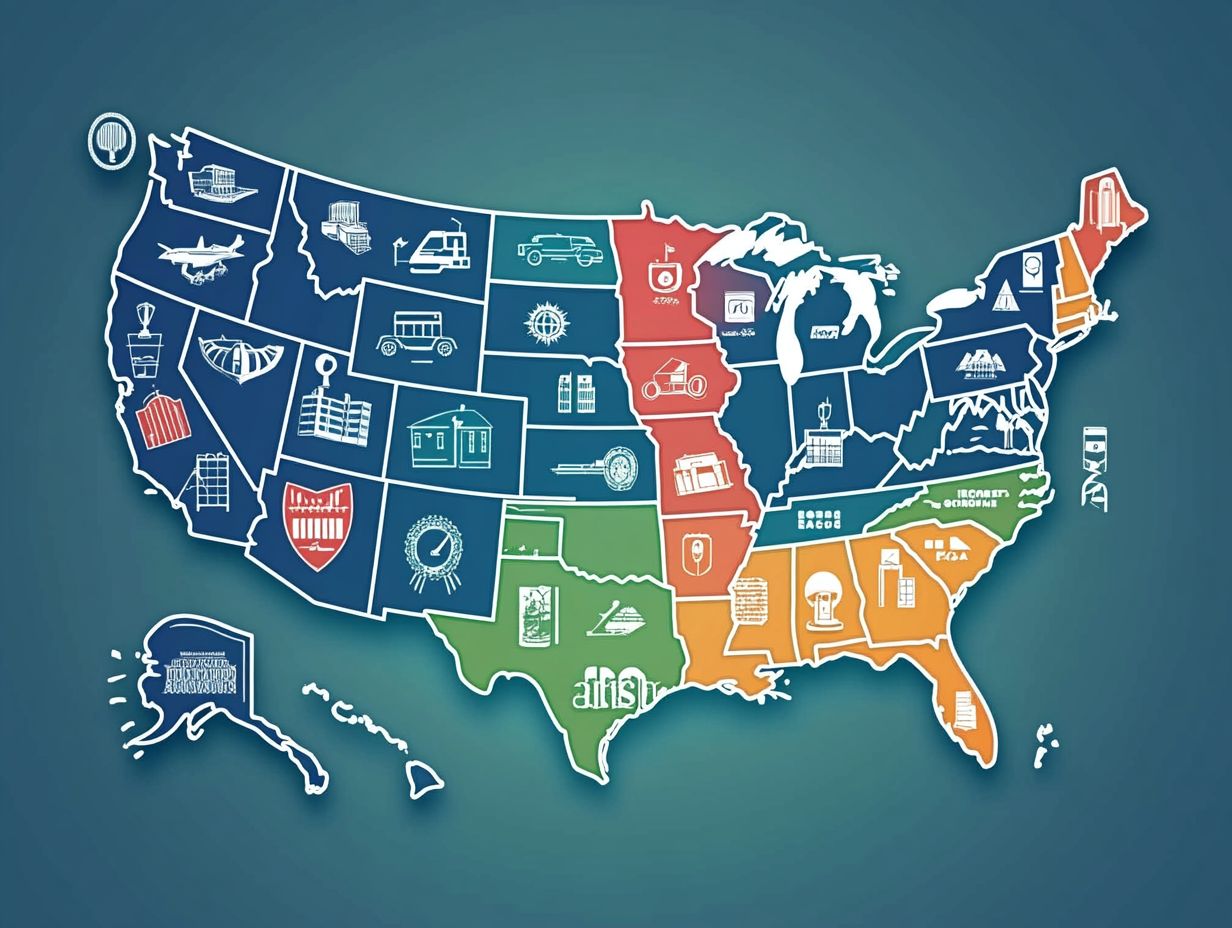Accreditation Agencies in the United States
Accreditation is vital in maintaining the quality and credibility of educational institutions.
This article delves into the various types of accreditation agencies. It highlights the distinctions between regional and national accreditation, as well as specialized versus institutional accreditation.
You will be guided through the accreditation process. Detailed insights into the necessary steps and requirements await you.
A comprehensive list of major accreditation agencies in the United States is provided, along with an exploration of why accreditation is crucial for both institutions and students.
Get ready to dive deep into this essential topic and enhance your understanding of accreditation!
Contents
- Key Takeaways:
- Types of Accreditation Agencies
- Accreditation Process
- Accreditation Agencies in the United States
- Importance of Accreditation for Institutions and Students
- Frequently Asked Questions
- What are accreditation agencies in the United States?
- Why is accreditation important for schools and programs?
- Who grants accreditation in the United States?
- What types of institutions and programs can be accredited?
- How does the accreditation process work?
- What are the benefits of attending an accredited institution or program?
Key Takeaways:

- Accreditation ensures quality and standardization in education.
- Regional accreditation is more common than national accreditation.
- The accreditation process involves evaluating academic programs and resources.
What is Accreditation and Why is it Important?
Accreditation is a pivotal process in higher education. It involves evaluating and validating educational institutions and their programs by recognized accrediting bodies. Accrediting bodies are organizations that assess and ensure the quality of educational institutions.
This process ensures that institutions meet established quality standards, providing an education that holds national and international recognition. As a result, the degrees and certifications you receive gain credibility and enhance your professional reputation.
Accreditation is essential for quality assurance, enabling you to make informed decisions about your education and career pathways.
Historically, accreditation emerged in the early 20th century as a response to the increasing demand for standardization and accountability in higher education. Its primary goal is to ensure that institutions not only offer adequate resources and qualified faculty but also maintain a robust and relevant curricular framework.
Accrediting organizations, whether regional or national, carry out extensive evaluations through self-studies and peer reviews. They scrutinize everything from faculty qualifications to student outcomes. This ongoing oversight can greatly affect your choices about which schools to attend and influence your opportunities post-graduation.
Employers often prefer candidates from accredited programs, associating accreditation with quality and rigorous academic standards. Employment prospects can also be influenced; many employers lean towards candidates with degrees from regionally accredited institutions, presuming they offer a more standardized quality of education.
Types of Accreditation Agencies
You will encounter various types of accreditation agencies that oversee and regulate the quality of educational institutions and their academic programs.
These include national accrediting bodies, regional accrediting organizations, and specialized programmatic accreditors that concentrate on specific fields of study. Each plays a crucial role in ensuring that educational standards are upheld across diverse disciplines.
Regional vs. National Accreditation
Regional accreditation and national accreditation represent two distinct avenues of educational recognition, each with its own scope and focus. You ll find that regional accreditation is often more esteemed, especially when it comes to traditional schools and state universities.
In contrast, national accreditation has carved out its niche among vocational and technical institutions, catering specifically to the diverse needs of non-traditional learners. This distinction is vital, particularly in how degrees are viewed and accepted for credit transfers.
Generally, degrees from regionally accredited institutions boast greater transferability across state lines compared to those from national institutions. The recognition status of these accreditations also plays a significant role in your eligibility for federal funding. Typically, regionally accredited schools enjoy greater access to such financial resources, a factor that can profoundly affect your economic situation.
To sum it up, consider researching accredited institutions. Accreditation impacts student loans and job opportunities, making informed choices essential for your future.
Specialized vs. Institutional Accreditation

Specialized accreditation focuses on specific programs or disciplines, such as nursing education or business. Institutional accreditation evaluates the entire educational institution, covering all its programs and operations.
Knowing the difference is crucial to your educational choices! For example, if you re enrolled in a nursing program seeking specialized accreditation, it ensures that the program meets the rigorous standards set by a governing body. This can significantly enhance the program s reputation and increase the employability of its graduates.
On the other hand, institutional accreditation assures that the entire college or university meets broader quality standards, including governance, faculty qualifications, and the overall student experience.
The importance of specialized accreditation is especially clear in fields like engineering or law, where specific skills are essential for professional success. Institutional accreditation, meanwhile, provides institutions with essential support in terms of credibility and public trust, reflecting a firm commitment to educational excellence.
Accreditation Process
The accreditation process is a detailed journey that educational institutions must navigate to demonstrate they follow quality standards established by accrediting commissions and organizations.
This process ensures that institutions meet the recognition criteria necessary for achieving accreditation.
Steps and Requirements for Accreditation
To achieve accreditation, you must meet specific requirements, which typically include self-evaluation (an internal review of your institution s strengths and weaknesses), documentation of educational training processes, and a comprehensive review by quality assurance agencies.
Your preparation often begins with a thorough self-study report. After that, you ll need to compile all necessary documents showing compliance with educational standards and policies.
A key part of this process involves hosting site visits from accrediting bodies, where external reviewers evaluate your institution’s facilities, faculty, and curriculum firsthand.
Post-visit feedback is vital; it allows you to address concerns, implement suggested changes, and demonstrate ongoing improvements.
By maintaining quality assurance throughout these steps, you not only prepare for accreditation but also cultivate a culture of excellence that benefits both your students and the broader community.
Accreditation Agencies in the United States
In the United States, accreditation agencies play a crucial role in ensuring educational quality and oversight. Esteemed organizations like the U.S. Department of Education and the Council for Higher Education Accreditation are instrumental in the accreditation process for higher education institutions.
Their involvement guarantees that education standards remain high and consistent, giving you confidence in the quality of the institutions you consider.
List of Major Accreditation Agencies

Major accreditation agencies in the United States include regional accrediting organizations like the Middle States Association and specialized bodies such as the Accreditation Commission for Education in Nursing. Each agency has its own criteria and focus areas.
These agencies are essential in maintaining educational quality and ensuring that institutions meet established standards. Regional accrediting organizations typically focus on entire degree-granting institutions, like universities and colleges, while specialized accrediting bodies focus on specific programs or fields of study.
For instance, the Commission on Accreditation in Physical Therapy Education plays a crucial role in ensuring that physical therapy programs meet rigorous educational standards. Understanding the distinctions between these agencies and their significance will help you navigate the complex world of accreditation, whether you are a prospective student or an institution seeking guidance.
Act now to ensure your program is accredited!
Importance of Accreditation for Institutions and Students
Accreditation is essential for both educational institutions and students. It guarantees quality education and institutional recognition, influencing students’ eligibility for federal financial aid.
It also enhances career prospects, making it a vital consideration in pursuing higher education.
Benefits and Implications of Accreditation
The benefits of accreditation extend beyond basic quality assurance; it elevates the status of educational institutions and opens doors to numerous career opportunities.
When programs are accredited, they tend to attract more funding from private and public sources, resulting in improved resources for the entire academic community. This financial boost supports infrastructure, faculty salaries, research initiatives, and student services.
Institutions with accredited programs often gain a better reputation, making them attractive to top-tier faculty and high-achieving students.
As a student, attending an accredited program can significantly increase your job placement rates after graduation. Employers prefer candidates from respected, recognized educational backgrounds, ensuring you enter your field fully prepared and competitive.
Frequently Asked Questions
What are accreditation agencies in the United States?

Accreditation agencies in the United States are independent organizations that evaluate and verify the quality of educational institutions, programs, and services. They ensure that schools and programs meet specific quality standards, providing students with a high-quality education.
Why is accreditation important for schools and programs?
Accreditation is crucial as it serves as a mark of quality and credibility. It shows students, employers, and other institutions that a school or program has met strict standards and is committed to ongoing improvement and delivering a quality education.
Who grants accreditation in the United States?
Independent accrediting agencies recognized by the Department of Education or the Council for Higher Education Accreditation (CHEA) grant accreditation in the U.S. These agencies evaluate and accredit various types of institutions and programs.
What types of institutions and programs can be accredited?
Accreditation agencies can accredit a wide range of educational institutions and programs, including universities, colleges, trade schools, vocational schools, online programs, and specialized programs like law or nursing schools.
How does the accreditation process work?
The accreditation process involves a comprehensive evaluation of an institution or program by an accrediting agency. This evaluation includes self-assessment reports, site visits, and documentation reviews. The agency then decides whether to grant accreditation based on specific standards.
What are the benefits of attending an accredited institution or program?
Attending an accredited institution or program offers many benefits, such as eligibility for federal student aid, credit transfer to other accredited schools, increased job opportunities, and assurance of quality education. It also gives students confidence and credibility in their chosen field.
Discover accredited programs today to unlock your potential and transform your educational journey!






